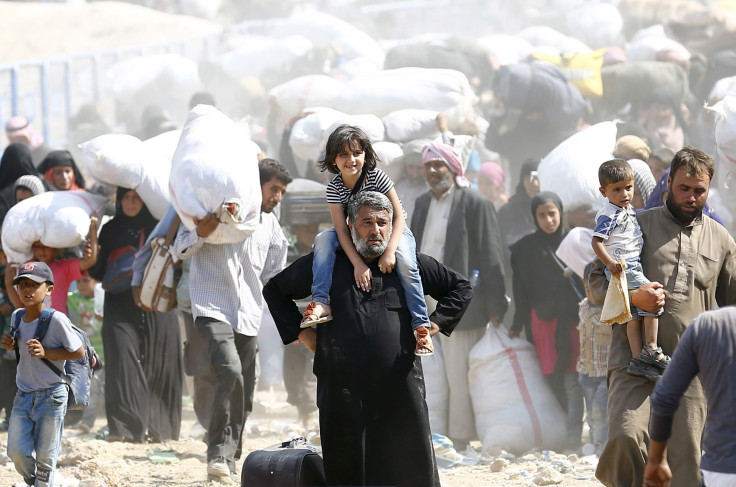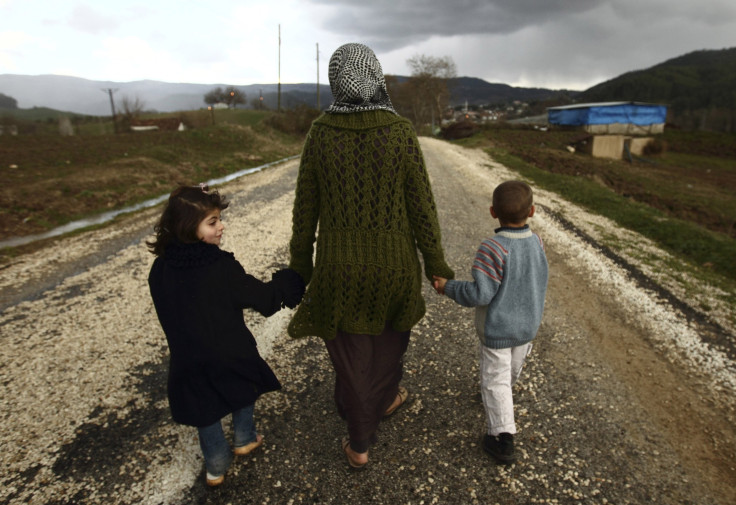US-Turkey Buffer Zone Could Allow Thousands Of Syrians To Return Home Without Fear Of Retribution

When Hussein, a 40-year-old Syrian carpenter from Aleppo, falls asleep at night he almost always has the same dream. He pictures his family boarding a plane -- leaving their lives as refugees in Marsin, southeastern Turkey, in return for a better life in Europe or America. But there remains a bigger dream he never thought possible -- not until now: returning home to Syria.
For the first time since the civil war began more than four years ago, Hussein, his wife, and their five children will have the chance of returning to their home in northern Syria without fearing retribution from regime forces or attacks by extremists.
Turkey and the U.S. are in the process of setting up a buffer zone that will extend 25 miles into Turkey, freeing the area of Islamic State militants and permitting entry to humanitarian organizations that can provide essential food and medical aid.
“When I heard the news of the buffer zone I was so happy,” Hussein said. “I was in Syria during the beginning of the war, but I have not been able to go back since because of all the fighting. If this buffer zone works I will be able to bring many of my relatives that are living in Turkey back to their homes.”
The so-called “safe zone” requires Turkish and American air forces to bomb Islamic State group militants, routing them from their posts along the border. A select group of Syrian rebels will monitor the situation on the ground, preventing the Islamic State group from returning.
Turkish officials said this week that the government decided to establish the safe zone as a means of securing its border and alleviating the humanitarian crisis for Syrian refugees in Turkey. As many as 1.7 million Syrian refugees could return back to their homes under the new plan, Turkish President Recep Tayyip Erdogan said Tuesday, though the number is not likely to be that high.
For the Syrians who do return home, a return to normal life is by no means assured. UN officials have expressed their reservations about returning refugees because of limited infrastructure and no safety guarantees.

"What you don't want to do is call something a safe zone, people flee to it, but it hasn't got sufficient protection," UN aid chief Stephen O'Brien told reporters Tuesday. "As our primary objective is the protection of civilians, we need to make sure there is protection in place and that is not always the role of the humanitarians, it needs to be established by others.”
Hussein says his house, although still standing, has been vandalized by Islamic State group militants. He knows the risks of returning home to Syria, but he is willing to take the chance. “I used to work and make a good living as an aluminum carpenter in Aleppo. I am also a religious man and had a strong community there to pray with,” he says. “God willing, I will make it back to that place.”
Hussein’s home in northern Syria, once dominated by rebels under the organization of the Free Syrian Army, is now occupied by dozens of rebel factions, some of whom are allied with al-Qaeda and the Islamic State group. Allegiances in the region are constantly shifting, Hussein says, and rebels that were once considered friends are now receiving paychecks from militants known across the world for their brutality.
The UN estimates that about 220,000 people have been killed since the civil war began but according to activists that number could be much higher since the UN stopped counting the death toll two years ago. More than 7.6 million people are internally displaced in Syria and another 4 million have fled the country, with more than a third going to Turkey.
A deadline for completion of the buffer zone has yet to be announced, but rebel sources on the ground in Syria say they are already in discussions with the U.S. about possible arm shipments that will be used for monitoring the safe zone.
For his part, Hussein remains sanguine. “The buffer zone might not work. The war has been going on for so long and so much has changed. But I still think I will try and go home.”
© Copyright IBTimes 2024. All rights reserved.











